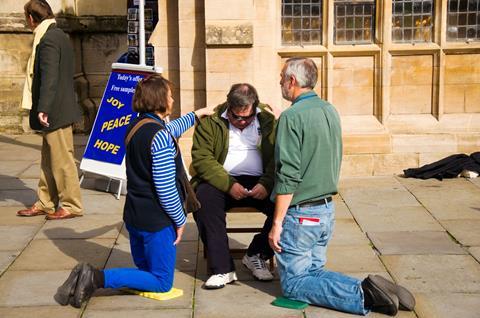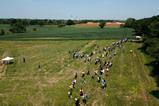Despite our nation’s rich Christian heritage, the power of prayer is being neutered in the UK, says Richard Gamble. And the problem isn’t limited to secular culture - even the Church is on mute, he says.

Since the pandemic closed churches, studies have found an openness to spirituality.
A study commissioned in May 2020 – just two months after the UK’s first lockdown – found that a quarter of adults in the UK had watched or listened to a religious service since the lockdown began and one in 20 had started praying. The Church of England received 6,000 phone calls to its prayer hotline in the first 48 hours of operation in the same month. And it’s not just a Covid thing. Since the pandemic, churches are welcoming newcomers regularly. And a recent Savanta ComRes survey found over 50 per cent of 18 to 34-year-olds now pray regularly, with 36 per cent attending church or taking part in a service – whether online or offline – at least once a month.
These statistics were widely challenged in the press, with many questioning the methodology of the survey and some even speculating that a ‘non-existent religious revival’ was being reported. Alongside this scepticism towards an apparent spiritual renewal, social media algorithms and the woke bandwagon have also aimed to diminish prayer, suggesting that is irrelevant and even impotent; an activity that is hidden and shameful.
Virtue signalling
Many now perceive prayer as an activity of last resort with no expected outcome – other than a self-serving sense that we are doing what we can in times when we feel powerless. When our Prime Minister contracted Covid last year, the newspapers ran the headlines: “Pray for Boris”. But did anyone expect God to answer? And if he did, was anyone grateful? Despite #prayforboris trending, I heard few voices of thanks to the God who answered.
“Praying” has become shorthand for showing solidarity in trying circumstances, rarely translated to an earnest seeking of our creator for help. A prayer carelessly thrown into the ether with no expectation of an answer nor anticipation of impact is a forceless and barren undertaking. If that’s all it is, I suggest we all get better value going for a pint down the pub.
Authorities are happy to take the good works the Church provides, but woe betide anyone that speaks about the power of prayer that strengthens them
During that awful sight of Christian Eriksen’s body lying prostrate receiving medical treatment during the Euros this summer, millions watching across the world felt distraught and helpless. Again social media lit up with prayer hashtags. Just a few hours later, the medics were being praised for their undoubtedly swift actions to save his life. Later that day I got a call from a sports journalist who asked: “When is your ‘big fella’ gonna get some of the credit then?” His irreverent nod to the Almighty highlighted a significant cultural shift. We have moved from the appreciation of God at work to the denial of any possibility of divine intervention.
Powerful prayer
Yet hundreds of thousands of people, today and thoroughout history, have testified to prayer being the most intimate, meaningful and powerful activity in their lives. They believe that God listens and acts. So how have we got here? Has society simply grown up and moved away from what author Jerry Coyne labels: “the most widespread and harmful form of superstition”, or has political correctness and, latterly, woke culture cancelled the power of prayer?
It was not always like this. On 23rd May 1940, King George VI announced a national day of prayer. The following Sunday, as British, Canadian and French soldiers fled under torrential Nazi fire toward Dunkirk beach, the King of England asked the nation to “turn, as our fathers before us have turned in times of trial, to the God most high.” Over a million people visited churches across the nation and prayed for the boys on the beaches. Churchill’s advisers indicated only 30,000 would be rescued – then came the ‘miracle of Dunkirk’ and 330,000 were saved. On the 9th June the nation returned to Church to thank God for his work.
Yet in Christopher Nolan’s Hollywood blockbuster Dunkirk, this narrative was omitted. The bizarre strategic decisions, meteorological improbabilities and physical miracles that led to the preservation of so many lives has been erased from populist history. The power of prayer that contributed to the miracle of Dunkirk has been removed from our national consciousness and downgraded to an account of extraordinary human effort which, though worthy of major appreciation, should not be viewed in isolation.
Freedom to celebrate
For Christians, faith is fuelled when we share and celebrate the things Jesus has done in our lives. Being on a 17 year journey to collect one million of these stories for a piece of public art called the Eternal Wall of Answered Prayer – a sculpture which hopes to preserve the power of prayer by being built out of one million bricks, each representing an answered prayer – I have discovered the Christian Church is on mute.
Stories are, at best, whispered not proclaimed. As our Christian brothers and sisters are hiding for their lives in Afghanistan under a Taliban regime, Christians working in the political, health, education and entertainment sectors in the UK cannot say what they believe for fear of being cancelled. Offering to pray for people, outside the aforementioned anaemic version and online hashtags, would risk their job and their families. Since when did religious freedom only become available for the wealthy and famous?
Christians seem to be singled out as the naughty religious children who should be seen and not heard. Authorities are happy to receive the £1bn+ input of good works the Church provides each year, but woe betide anyone that actually speaks about the love that inspires them or the spiritual power of prayer that strengthens them!
The power of prayer has been removed from our national consciousness
Sure, the fearful majority are not shouting about it but, secretly, the belief in the power of prayer remains. We must hold fast to the important role that prayer has played in forming our national identity, and the positive impact the Church has had on our society – especially in the last year.
Our nation has a rich heritage, embedded in Christian prayer. While many may view it as a false hope or a comfort blanket when you can do nothing more, Christians must be bold in sharing the spiritual power of prayer. If younger generations are exploring faith and prayer, it shouldn’t be a matter of debate. It should be encouraged, embraced and set an example for all of us.





































